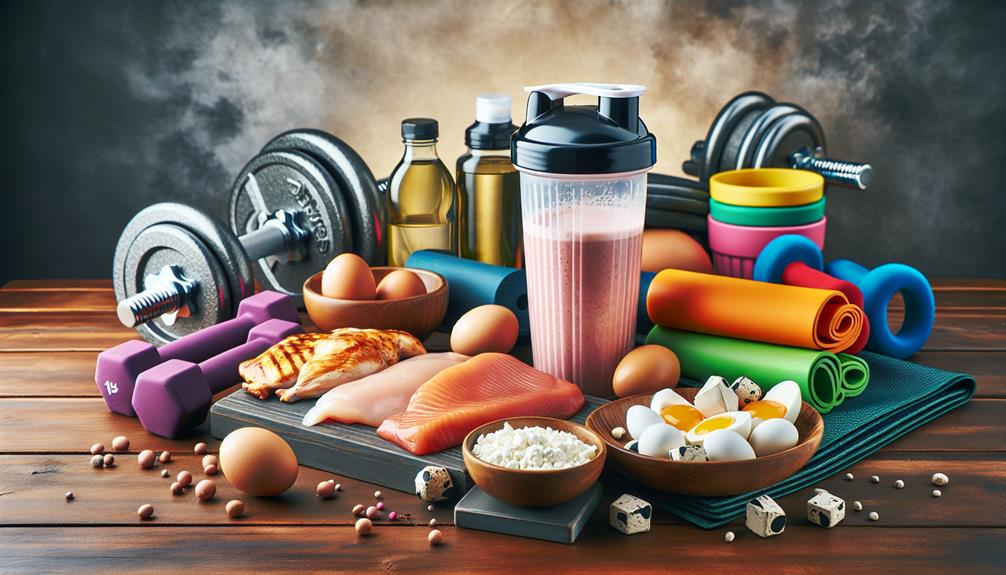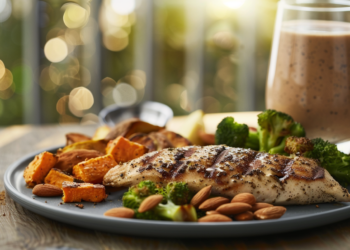To optimize pre-workout nutrition, focus on these key tips: Hydrate well for peak performance. Consume a balanced mix of protein, carbs, and fats for energy. Time your meals 2-3 hours before exercise for best results. Carbs are crucial for endurance and energy. Pair protein with carbs for muscle support. Include healthy fats for sustained energy levels. Consider supplements like creatine and BCAAs wisely. Avoid common mistakes like skipping meals and overeating. Remember, starting with these basics sets the stage for a successful workout routine.
Key Takeaways
- Hydrate adequately for peak performance and focus.
- Consume a balanced meal 2-3 hours before exercise.
- Prioritize carbohydrates for energy and endurance.
- Include protein for muscle repair and growth.
- Incorporate healthy fats for sustained energy levels.
Importance of Hydration
Why is proper hydration crucial for optimizing your pre-workout performance?
Maintaining adequate hydration levels is essential for peak athletic performance. Dehydration can lead to decreased exercise performance, increased fatigue, and impaired focus during workouts. Proper hydration ensures that our bodies can effectively regulate temperature, transport nutrients, and remove waste products. One key aspect of hydration is maintaining electrolyte balance, as these minerals play a vital role in muscle function and nerve signaling.
To optimize hydration before a workout, it's important to develop effective hydration strategies. One strategy is to monitor fluid intake throughout the day, aiming to consume around 3.7 liters (125 ounces) of water for men and 2.7 liters (91 ounces) for women daily, including water from food and other beverages. Additionally, drinking about 500-600 ml (17-20 ounces) of water 2-3 hours before exercise and another 250-300 ml (8-10 ounces) 10-20 minutes before starting the workout can help ensure adequate hydration levels. Incorporating electrolyte-rich foods or beverages, such as sports drinks or coconut water, can further support optimal hydration and electrolyte balance. By prioritizing proper hydration and implementing effective hydration strategies, individuals can enhance their pre-workout performance and overall exercise experience.
Balanced Macronutrient Intake
Ensuring a well-rounded balance of macronutrients in our diet is essential for supporting optimal pre-workout performance and overall fitness goals. When it comes to pre-workout nutrition, understanding the importance of nutrient balance can significantly impact our exercise performance. Protein, carbohydrates, and fats are the three macronutrients that our bodies require in varying amounts to function effectively during physical activity.
Protein is crucial for muscle repair and growth, making it an essential component of pre-workout meals or snacks. Carbohydrates provide the primary source of energy for our muscles, aiding in endurance and performance during exercise. Healthy fats are also important for sustained energy and overall health. Balancing these macronutrients in our pre-workout nutrition can optimize our body's ability to perform at its best.
When considering meal timing, it's beneficial to consume a well-balanced meal or snack containing all three macronutrients around 1-3 hours before exercise. This timing allows for proper digestion and absorption, providing the necessary fuel for our workout without causing discomfort. Striving for nutrient balance in our pre-workout meals can enhance our performance, recovery, and progress towards our fitness goals.
Timing of Pre-Workout Meals

To optimize pre-workout performance, it's essential to consider the timing of our meals before exercise. Meal timing plays a crucial role in providing the body with the necessary nutrients to fuel our workouts effectively. Consuming a balanced meal containing carbohydrates, proteins, and fats around 2-3 hours before exercise can help enhance performance. This timeframe allows for proper digestion and absorption of nutrients, providing a sustained release of energy during the workout.
Nutrient timing is another important aspect to consider when planning pre-workout meals. It involves consuming specific nutrients at strategic times to maximize performance, recovery, and adaptations to training. For pre-workout nutrition, focusing on carbohydrates can be beneficial as they serve as the primary energy source during exercise. Including moderate amounts of protein can also help support muscle repair and growth.
Benefits of Carbohydrates
Carbohydrates play a vital role in providing the necessary energy for optimal workout performance and endurance. As energy sources, carbohydrates are essential for fueling physical activity, making them a cornerstone of pre-workout nutrition. When consumed before a workout, carbohydrates are efficiently converted into glycogen, which is stored in muscles and the liver for later use. This process ensures that our bodies have a readily available source of energy to power through intense exercise sessions.
Carbohydrates act as the primary performance fuel during high-intensity workouts, such as weightlifting or sprinting. They provide quick energy that's easily accessible, allowing muscles to work at their best capacity. By incorporating carbohydrates into your pre-workout meals or snacks, you can maximize your performance, delay fatigue, and sustain endurance throughout your training session. Opt for complex carbohydrates like whole grains, fruits, and vegetables, as they offer a steady release of energy to support prolonged physical exertion. Remember, the right balance of carbohydrates is key to optimizing your workout performance.
Protein Requirements for Energy

Protein also plays a significant role in meeting our energy needs during workouts, complementing the performance benefits of carbohydrates. Amino acids, the building blocks of protein, are essential for muscle recovery and growth. Whey protein, a high-quality protein source, is particularly beneficial for muscle building due to its quick digestion and rich amino acid profile. Consuming protein before a workout can help prevent muscle breakdown during exercise and provide the necessary energy for optimal performance.
| Protein Type | Benefits |
|---|---|
| Whey Protein | Fast-digesting protein rich in essential amino acids, ideal for muscle building. |
| Casein Protein | Slow-digesting protein that can sustain amino acid levels in the blood for longer periods. |
| Plant-Based Protein | Suitable for vegetarians/vegans, provides essential amino acids for muscle recovery. |
Including protein in your pre-workout nutrition can enhance muscle protein synthesis, support muscle recovery, and improve exercise performance. Whether it's through shakes, bars, or whole foods, prioritizing protein intake alongside carbohydrates can help you maximize your workouts and achieve your fitness goals.
Role of Fats in Pre-Workout Nutrition
Incorporating healthy fats into your pre-workout nutrition regimen can provide essential energy sources and support optimal performance during exercise. Fat sources such as avocados, nuts, seeds, and olive oil contain valuable nutrients like omega-3 fatty acids and can help sustain energy levels throughout your workout.
When considering fats in your pre-workout meal, it's important to maintain energy balance. While fats are a concentrated energy source, they digest slowly, making them ideal for providing a steady source of fuel during longer workouts. However, consuming large amounts of fats immediately before exercise may lead to discomfort due to slowed digestion.
To optimize the benefits of fats in your pre-workout nutrition, consider incorporating moderate portions of healthy fats about 2-3 hours before your workout. This timing allows for adequate digestion and absorption, providing sustained energy without causing digestive issues. By balancing your fat intake with other macronutrients like carbohydrates and proteins, you can enhance your exercise performance and support your overall fitness goals.
Supplements for Performance Enhancement

When seeking to enhance performance during workouts, it's beneficial to explore the use of supplements designed to support physical capabilities and overall exercise efficiency. These supplements often contain a specific ingredient breakdown aimed at maximizing energy, endurance, and muscle function. Common ingredients include creatine, beta-alanine, caffeine, and branched-chain amino acids (BCAAs), each serving a different purpose in improving workout performance.
Creatine is known for increasing strength and power output, beta-alanine helps buffer lactic acid build-up, caffeine enhances focus and energy levels, and BCAAs aid in muscle recovery and endurance. Dosage recommendations for these supplements can vary based on individual factors such as weight, tolerance levels, and specific fitness goals. Consulting with a healthcare provider or a nutritionist to determine the appropriate dosage is crucial to ensure optimal effectiveness and safety.
Avoiding Common Mistakes
To optimize workout performance and prevent setbacks, it is crucial to be mindful of common mistakes that can hinder progress and results. When it comes to pre-workout nutrition, avoiding common pitfalls and steering clear of nutrition misconceptions is key. Let's explore some of the most prevalent mistakes individuals make:
| Common Pitfalls | Nutrition Misconceptions | Ways to Improve |
|---|---|---|
| Skipping pre-workout meal | More protein is better | Plan and prepare balanced meals in advance |
| Overeating before exercise | Carbs are the enemy | Opt for complex carbs for sustained energy |
| Relying too much on supplements | Fats should be avoided | Focus on whole foods for essential nutrients |
| Ignoring hydration needs | Timing is not important | Hydrate adequately throughout the day |
Frequently Asked Questions
Can Pre-Workout Nutrition Have Different Effects on Different Types of Workouts?
Yes, pre-workout nutrition can have varying effects on different workouts. Timing differences and macronutrient ratios influence performance variations and exercise outcomes. Understanding these factors aids in optimizing nutrition for specific types of physical activity.
How Does Pre-Workout Nutrition Impact Recovery Post-Exercise?
Pre-workout nutrition significantly impacts recovery post-exercise. Proper nutrient timing supports muscle repair and enhances performance. It's essential to consider these factors to optimize the recovery benefits and overall effectiveness of your post-workout routine.
Are There Specific Foods or Nutrients That Can Help With Mental Focus and Energy During a Workout?
When it comes to mental clarity and performance enhancement during workouts, we've found that certain foods like bananas, nuts, and dark chocolate can work wonders. They give us that extra boost without the crash later on.
Is It Necessary to Adjust Pre-Workout Nutrition Based on Individual Fitness Goals or Body Composition?
Adjusting pre-workout nutrition is crucial for meeting individual fitness goals and body composition. Meal timing, nutrient timing, macronutrient ratios, and supplement usage should align with personal needs to optimize performance and results.
What Are Some Practical Strategies for Incorporating Pre-Workout Nutrition Into a Busy Schedule or Early Morning Workout Routine?
When it comes to incorporating pre-workout nutrition into a busy routine or early morning workout, meal timing plays a significant role. Quick snacks like bananas or yogurt and staying hydrated are key for maintaining energy balance.
Conclusion
In conclusion, it's crucial to prioritize optimal pre-workout nutrition to enhance performance and fuel our bodies effectively. By paying attention to hydration, balanced macronutrient intake, timing of meals, and incorporating carbohydrates, protein, and fats, we can set ourselves up for success in our workouts.
Remember to avoid common mistakes and consider supplements to further enhance performance. Embracing these strategies will help us achieve our fitness goals with finesse and grace.













